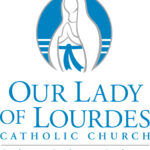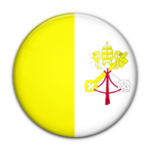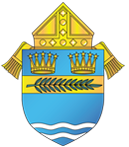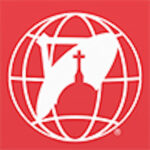Additional resources to help you on your journey of Faith
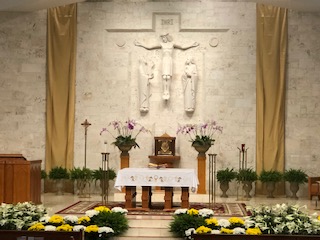
Altar Flowers Offered
In Memory of
William & Marcella Valerioti
![]()
Requested By
Donna Valerioti
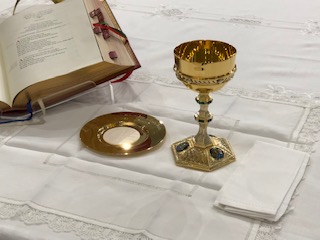
Altar Bread Offered
In Loving Memory of
Glenn Leech
![]()
Requested By
Women of Grace – Cindy Hitson
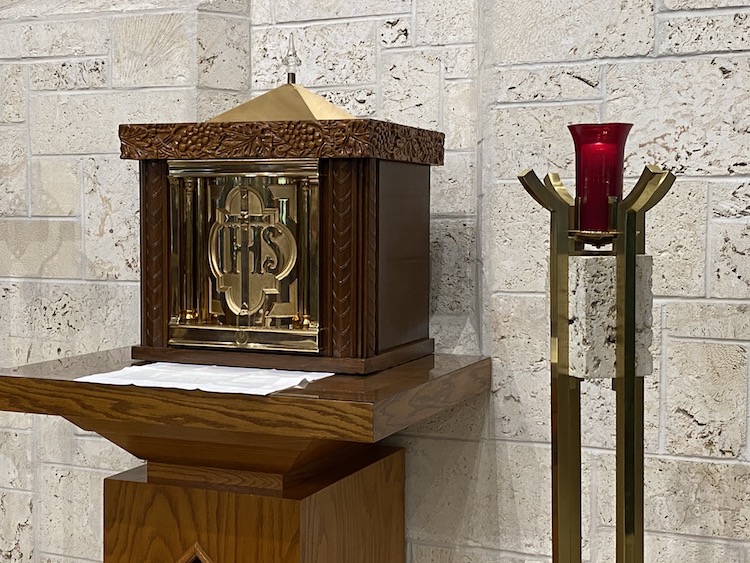
Sanctuary Lamp Offered
In Memory of
Frances Maiorino
![]()
Requested by
Meril Stumberger
CLICK BUTTONS BELOW TO ACCESS SECTIONS
MASS READINGS AND VIDEO REFLECTION
The Solemnity of the Most Holy Trinity, Cycle C
Fostering God-Centered Relationships Through a Life of Love and Sharing
To celebrate the Solemnity of the Most Holy Trinity is to rejoice in the mystery of God’s divine life—and our participation in it. God the Father created us in love, God the Son redeemed us through His saving sacrifice, and God the Holy Spirit continues to sanctify and guide us in holiness.
This solemn feast invites us to reflect on the relationships in our own lives: Are they centered on God? Do they reflect the unity, generosity, and love that flows within the Trinity?
Let us foster relationships that lead us closer to God. Let us live lives of sharing, just as the life of God is a life poured out in love. And let us grow in devotion, love, adoration, and service to the one God who is Father, Son, and Holy Spirit.
“Whoever loves me will keep my word, and my Father will love him, and we will come to him and make our dwelling with him.” (John 14:23)
Monday
Tuesday
Wednesday
Thursday
Friday
Saturday
Sunday
2 Cor 6:1-10/Ps 98:1-4/Mt 5:38-42
2 Cor 8:1-9/Ps 146:2-9a/Mt 5:43-48
2 Cor 9:6-11/Ps 112:1bc-9/Mt 6:1-6,16-18
2 Cor 11:1-11/Ps 111:1b-8/Mt 6:7-15
2 Cor 11:18-30/Ps 34:2-7/Mt 6:19-23
2 Cor 12:1-10/Ps 34:8-13/Mt 6:24-34
Gn 14:18-20/Ps 110:1-4/1 Cor 11:23-26/Lk 9:11b-17
FAITH FORMATION
Our ministry aims to help the faithful adult to grow in both Human and Christian maturity.
As part of this goal we offer links to Adult Faith Formation videos.
The Most Holy Trinity: A Mystery to Be Lived
The Solemnity of the Most Holy Trinity invites us to contemplate the central mystery of our faith: that the one true God is a communion of three Divine Persons—Father, Son, and Holy Spirit. Not three gods, but one God in three Persons, eternally united in perfect love and mutual self-giving (cf. Mt. 28:19; 2 Cor. 13:13; Jn. 14:16–17).
The Father, from all eternity, begets the Son; the Son is eternally begotten of the Father; and the Holy Spirit proceeds from the love between the Father and the Son. This inner life of God is not a distant abstraction—it is the source and model of our own life, for we are made in the image and likeness of this triune God (cf. Gen. 1:26). Through Christ and by the Spirit, we are invited into this divine communion.
As the Catechism of the Catholic Church teaches: “By sending his only Son and the Spirit of Love in the fullness of time, God has revealed his innermost secret: God himself is an eternal exchange of love, Father, Son and Holy Spirit, and he has destined us to share in that exchange” (CCC 221).
The mystery of the Trinity is not only something we profess with faith—it is something we are called to live. This reality transforms how we relate to one another, how we give of ourselves, and how we use what has been entrusted to us.
Fostering God-Oriented Relationships
God is not isolation, but relationship. The Father, Son, and Holy Spirit exist in a perfect communion of love. To be created in God’s image is to be created for communion. We are not meant to walk alone. The Trinity teaches us that unity, not division, is the mark of divine life.
This means we are called to foster relationships that lead us closer to God. Whether within our families, friendships, or parish community, we are invited to reflect the love, truth, forgiveness, and unity that mark the inner life of God Himself. In the Gospel of John, Jesus says: “Whoever loves me will keep my word, and my Father will love him, and we will come to him and make our dwelling with him” (Jn. 14:23). The divine Persons dwell in us when we open ourselves in love to them and to one another.
Relationships rooted in selfishness, manipulation, or fear do not reflect the Trinity. But when we gather others into communion, when we live with love, humility, patience, and kindness, we mirror the unity of the Father, Son, and Holy Spirit, whose eternal bond is perfect love.
Living a Life of Sharing
The Trinity is a mystery of self-giving love. The Father gives the Son. The Son offers Himself on the Cross for our salvation. The Spirit is poured out upon the Church at Pentecost. Divine love is never earned—it is always a gift. If we are children of this God, then our lives must also be lives of sharing.
This call to generosity extends far beyond material charity. It involves the sharing of time, presence, compassion, and forgiveness. A life rooted in the Trinity is not closed in on itself, but constantly open to the needs of others, just as the inner life of the Trinity is one of perfect self-giving, sharing, and communion. We do not live for ourselves alone; we live to make a sincere gift of ourselves—even when it requires sacrifice—because this is how God loves: totally, faithfully, and without reservation.
When we love with this kind of generosity, we are not merely doing good works—we are imitating God. We are living as sons and daughters of the Triune God whose very nature is love poured out.
Being Faithful Stewards of God’s Abundance
Everything we have—our talents, possessions, opportunities, and even our very breath—is a gift from God. We are not owners of these things, but stewards. Trinity Sunday calls us to remember that the divine life we have received must bear fruit in the way we use what God has given us.
To be good stewards means recognizing the abundance we have been entrusted with and using it not just for ourselves, but for the good of others and the glory of God. Are we generous with our time? Are we attentive to the needs around us? Do we share our gifts, or are we afraid to let go?
God’s love is not meant to be stored up, but multiplied. As stewards of divine grace, we are responsible for carrying that love into the world through acts of mercy, encouragement, and joyful service.
The mystery of the Most Holy Trinity is not meant to be solved—it is meant to be lived. When we foster relationships centered on God, when we live with generosity, and when we use our gifts in love and service, we reflect on earth the eternal communion of love that is the life of God Himself.
In the words of St. Augustine: “If you see charity, you see the Trinity.”
The current norm regarding fasting before communion is Canon No. 919:
§1. A person who is to receive the Most Holy Eucharist is to abstain for at least one hour before holy communion from any food and drink, except for only water and medicine.
§3. The elderly, the infirm, and those who care for them can receive the Most Holy Eucharist even if they have eaten something within the preceding hour.
The calendar is based upon the General Roman Calendar, promulgated by Pope Saint Paul VI on February 14, 1969, subsequently amended by the Holy See, and the Proper Calendar for the Dioceses of the United States of America, approved by the USCCB and confirmed in 2010 by the Congregation for Divine Worship and the Discipline of the Sacraments.
ARE YOU AN ACTIVE PARISHIONER?
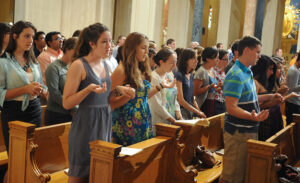
A Parish is not simply a “branch office” of the Church, nor a periodic audience of people, nor an occasional public; but it is a formally organized social group. It is a portion of a Diocese under the authority of a Priest legitimately appointed to secure in virtue of his office for the faithful dwelling therein, the helps of religion.
The faithful are called parishioners, and they become parishioners by acquiring a domicile or a quasi-domicile within the geographical boundaries or territory of the Parish.
Parishioners could be active parishioners or non-active parishioners, and the question of parishioner status is important because parishioners look to their Parish for many services such as:
- Parishioner tuition rates in our Catholic schools;
- The use of our facilities for liturgical services such as baptisms, weddings and funerals;
- And certification as eligible sponsors at Sacramental celebrations.
These rights and services within the church bring with them certain obligations, as in any form of community.
To be considered “active,” a parishioners must be:
- Registered in the parish;
- Attend Mass faithfully;
- Support the life of the parish by sharing time and talents in service;
- And sharing treasure (tithing) to build up the community.
Active participation in Christian Stewardship makes you an ACTIVE parishioner.
DONATIONS

Donate To Parish
Our Parish is sustained through the Generosity Of Parishioners And anyone of goodwill.

Donate A Lasting Legacy
A Bequest is a unique gift of money or assets left through your will and is an investment in the future of your Parish.
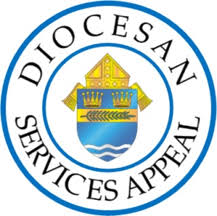
Donate To DSA Campaign
Each Parish has the responsibility to support the needs and ministries of the Diocese.
